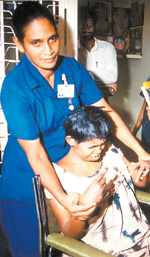
|
|
|
HELPING
HAND FOR ELDERS Now her mobility is improving, thanks to a kind physiotherapist Mr. Bandara who visits her twice a week,to help her exercise and strengthen her muscles (with a care assistant, trained in physiotherapy also visiting weekly) . He has taught her several exercises to do daily on her own. That way she can learn to help herself
This free service is run by Mrs. Celine Samarasinhe, who having 25 years experience with the British National Health Service as a district/community nurse, founded Samarasinhe Healthcare Assistance and Rehabilitation for the Elderly (S-H-A-R-E), a charity in UK, using her knowledge to train nurses to provide a community nursing service for the poor and underprivileged. The Health Centre in Kotahena, her first pilot project in Sri Lanka was launched in 1999, coincidentally the Year of the Elderly. "We hope to expand to Kalutara soon," says Mrs. Samarasinhe, adding that they have found the area to be quite needy. They also assist the railway neighbourhood down Walles Street, Colombo 15. One of the main reasons she chose Kotahena as her base, she says, was its urgent need for such care and its multi-cultural and multi-religious society. Thus, she ensures that her organisation helps everyone regardless of race or religion. Some residents had been wary at first, thinking that in exchange for the care they would have to convert from their religion, said Nursing Sr. Fatima Fernando. "We respect all religions and expect nothing from the people in return. The staff acts with compassion and kindness and earns the trust of the patients,”Ms. Samarasinhe adds. The Centre has a seven-member team comprising a Nursing Sister in-charge, two senior staff nurses (all trained in community nursing), two care assistants, a social worker and a physiotherapist. The medical team sticks to a a daily schedule of visits by van after deciding whom they will be visiting and with what frequency (daily, weekly, monthly etc). However, they are always flexible if an emergency or special request is made en route, says Sr. Fatima. The main difference between hospital nursing and community nursing is that the former literally spoon-feeds the patients, while the latter, teaches people how best to help themselves, says Mrs. Samarasinhe. They identify the patient’s individual needs and problems and offer advice or assistance accordingly. As it is beyond their purview to prescribe medication, they act as a mediating body between the visiting doctors and the patients. There are four doctors who volunteer their time and effort towards this cause. "We monitor the patient’s medication and diet, check on their progress and maintain a record of each patient," says Sr. Fatima. They also go through each chart and make sure that the patient's pressure and blood sugar are kept under control. In the event of some irregularity, the nurses inform a doctor or instruct the patient to visit their regular doctor or clinic for a check-up (depending on the patient's resources and condition). Thereafter, whatever medication they need is obtained by a member of the medical team and handed over with instructions on dosage etc. The Centre also tries to educate the community on basic welfare and good health as "we're strong believers that prevention is better than cure,” says Mrs. Samarasinhe. Community nurses need to update their skills regularly, she adds. The nurses have a weekly discussion with nurse Nathalie Gunawardena, who updates their theoretical knowledge and discusses the various problems they face in their everyday work. Keeping abreast of current developments is an important part of the nursing profession, she feels. Another project under their umbrella is the 'Meals on Wheels' project, funded by Mrs. Samarasinhe's church in UK (The Sacred Heart Church in Mill Hill). This focuses on families who lack proper nutrition. In the case of Anusha (name changed), a severely disabled and anaemic young girl, the centre provides her with her daily meals. Others like her receive meals and even dry rations, as they are unable to afford them on their own. Adding a grateful thanks for the support of the Management, Foundation trustees, the Archbishop (who donated the Centre) and many sponsors like SriLankan Airlines who sponsored her ticket to Sri Lanka this time, and other donors committed to this cause, Mrs Samarasinhe says anyone interested in helping or volunteering their services can contact the Centre on 4616894. |
|
Copyright © 2001 Wijeya Newspapers
Ltd. All rights reserved. |
 Mrs.
Perera, 62, (name changed) suffers from a stiff arm and leg, the
painful legacy of a stroke she had 13 years ago, whilst working
in the Middle East. On her return to Sri Lanka she spent all her
money on physiotherapy and medication but for the past eight years
had no medical care as her money had run out.
Mrs.
Perera, 62, (name changed) suffers from a stiff arm and leg, the
painful legacy of a stroke she had 13 years ago, whilst working
in the Middle East. On her return to Sri Lanka she spent all her
money on physiotherapy and medication but for the past eight years
had no medical care as her money had run out.  Nursing
the sick and helping them help themselves is the main focus of
the Kotahena Community Health Centre, based at the St. Lucia's
Cathedral premises that provides a mobile community nursing service
to elders in the Kotahena area who find it difficult to cope on
their own.
Nursing
the sick and helping them help themselves is the main focus of
the Kotahena Community Health Centre, based at the St. Lucia's
Cathedral premises that provides a mobile community nursing service
to elders in the Kotahena area who find it difficult to cope on
their own.